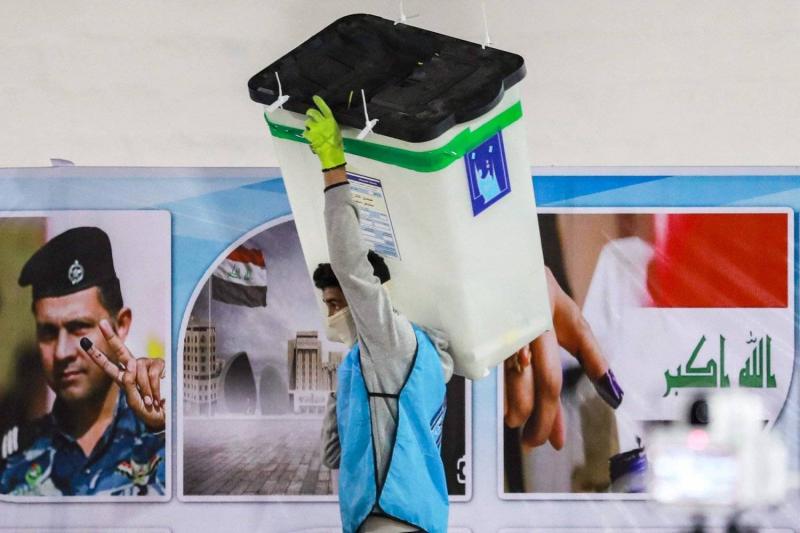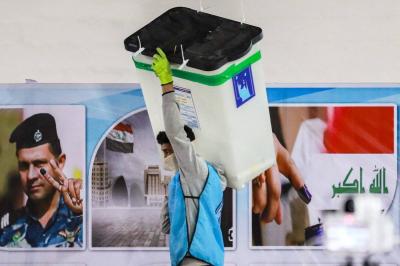Recently, there has been increasing talk about a parliamentary movement to amend the electoral law in preparation for holding early legislative elections in Iraq. However, the parliamentary legal committee asserts that discussions on this matter are merely "political and media-related," and that it has not received any requests either from within or outside the committee regarding this issue. Furthermore, election specialists exclude the possibility of early parliamentary elections due to a lack of preparations for them.
Member of the parliamentary legal committee, Raed Al-Maliki, states, "The committee has not noticed any parliamentary movement to submit a legal proposal or project regarding the amendment of the electoral law, nor has it received any requests concerning amendments to the electoral law, either from within or outside the committee; it is merely political and media talk."
He adds, "However, from a constitutional and legal standpoint, there is no obstacle to amending the electoral law; like any law, it can be amended if a proposal is submitted in accordance with legal procedures along with signatures, as was the case with the third amendment. Similarly, if a draft law comes from the government, in both instances, there is nothing constitutionally or legally preventing the amendment of the electoral law."
Al-Maliki further explains, "Politically, there is talk suggesting that numerous changes and amendments to the electoral law may affect the stability of the political system, which was previously highlighted when objecting to the 2020 electoral law and advocating for the continuation of the individual system to allow its effects to emerge over time. However, the others did not respond to this, claiming that this system caused political instability. Currently, the same parties that defended the change during that brief period are now speaking about the prohibition of changing the electoral law, claiming it does not lead to political stability."
He notes that "the real reason behind the reluctance to change the electoral law is that political blocs have gained benefits; they approach the law based on its advantages to them."
Al-Maliki clarifies that "postponing elections is unconstitutional, as the country will enter into a constitutional vacuum when the current parliamentary term ends in October of next year, 2025. At that point, the government will become a caretaker government and the parliament will no longer be able to perform its duties, so postponing elections is not possible. Presenting early elections is feasible through a request to dissolve the parliament, which is subject to constitutional procedures, but it cannot be postponed or extended."
Experts attribute the difficulty of holding early elections to various issues related to the electoral law and the electoral system as a whole, underscoring the need for a comprehensive review of this system in all its details.
In this context, former deputy head of the Independent High Electoral Commission in Iraq, Saad Al-Rawi, states, "According to the constitution and law, the electoral cycle is four years, but any provision in the electoral law or constitution that is not clearly defined is interpreted in favor of the political actor, which is the problem in the electoral system."
Al-Rawi mentions, "The Iraqi electoral law consists of only 25 pages, yet it includes the elections for the Council of Representatives and provincial councils, while Australia's electoral law, for instance, consists of 522 pages. When early elections are held in the latter, the new parliament is formed within 36 days of dissolving the old parliament, while forming a government takes only a few days. The Iraqi law does not detail this process."
He adds, "The term of the Commissioners Council ends at the beginning of July next year, and according to the Commission law, no entity has the right to extend its term, but it has been previously extended by the parliament. The current question is whether there will be another extension or whether a new Commissioners Council will be formed."
Al-Rawi points out that "in Tunisia, for example, two members of the Commissioners Council are replaced every two years, allowing the council to remain complete at all times. In Iraq, however, the entire council is dissolved, a new council is brought in, and then workshops and training sessions are conducted by international organizations, especially the United Nations, for the new council to be able to conduct elections."
Another issue, Al-Rawi states, is that "there are more than 500 special-grade employees (from section heads and above, such as department heads, assistant general directors, general directors, and members of the Commissioners Council) who have all been removed from their positions, and this poses a problem hindering the possibility of holding early elections.”
He continues, "Additionally, there are numerous disagreements in the electoral law regarding district registration, seat distribution, the type of bloc, and whether to retain or abolish the Sainte-Laguë method; all these issues are not clearly defined by the law."
Al-Rawi stresses the necessity of "conducting a comprehensive review of the electoral system in all its details—the electoral system, party law, electoral law, replacement law, and the law of the electoral commission."
For his part, the head of the Regional Center for Strategic Studies, Ali Al-Sahib, asserts that "the parliamentary elections, held every four years, always witness waves of debate and controversy from all parties. Each side seeks to benefit from them in its favor, whether through a single district or multiple districts."
Al-Sahib adds that "the amended Sainte-Laguë electoral law (1.9/1.7) is actually tailored to the interests of major blocs with political influence and financial resources; nonetheless, these blocs still attempt to change the provisions of this law, even though Sainte-Laguë is merely a mathematical formula for distributing seats among parliament members."
He asserts that "moving toward early elections and changing personnel and positions is a joke that politicians indulge in during their free time; there will be no early elections, and that is that. In Iraq, each one weeps for his Layla."




